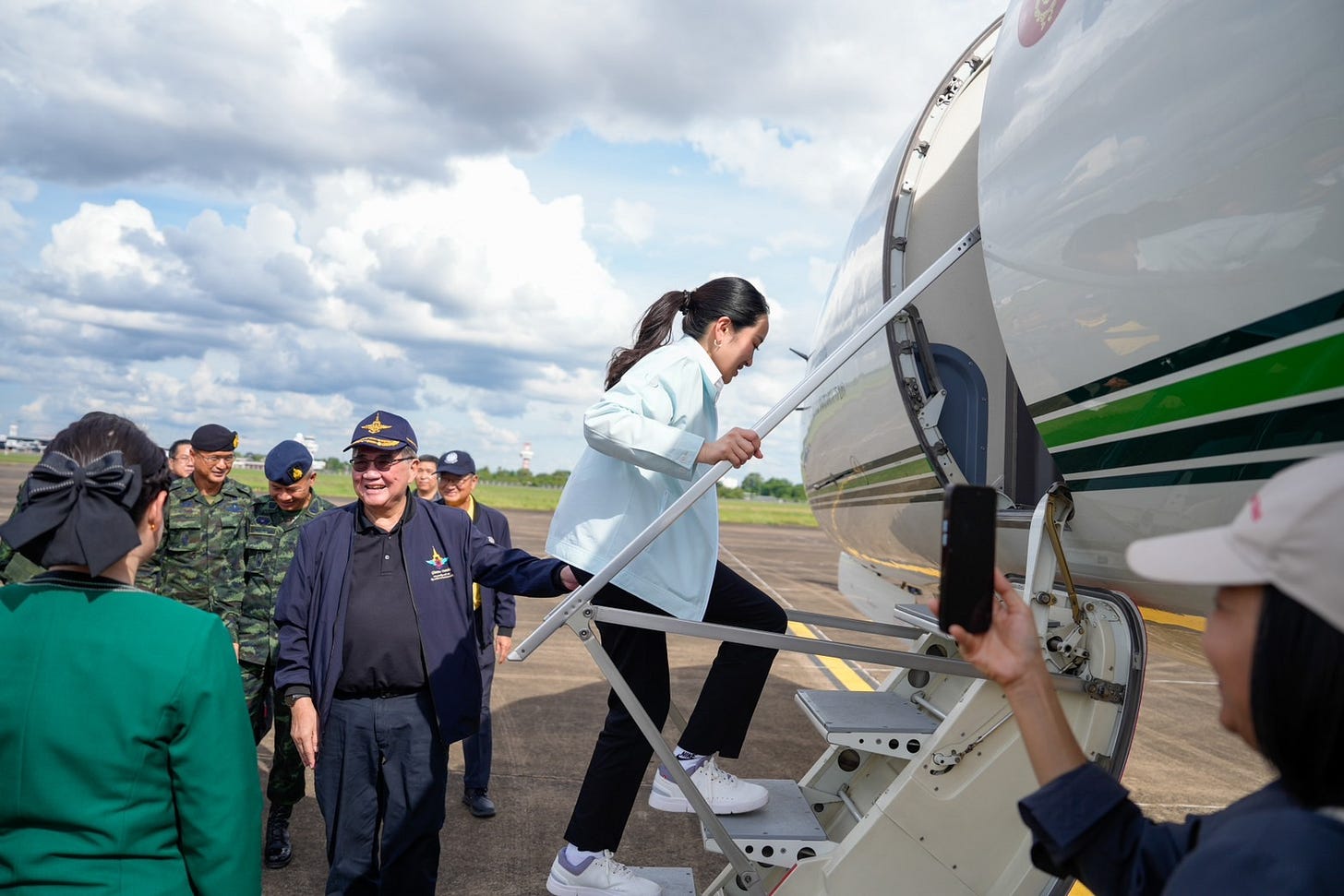Why Paetongtarn's Premiership is Still in Danger
Will the Constitutional Court remove her from office?

In my last post, I wrote about how Prime Minister Paetongtarn Shinawatra has managed to stabilize her Pheu Thai-led coalition government, keeping all political parties except Bhumjaithai (which was due to be ejected anyway) inside her government. On the parliamentary front, the prime minister can breath a sigh of relief for now, and her survival in the short term seems guaranteed. The question, however, is: how short is the short term?
In another epic act of trolling, Cambodia’s de facto leader Hun Sen said yesterday that Thailand is about to get another prime minister within three months — although he declined to say who it would be. Let’s say Hun Sen is right. How might this happen? In this post, I’ll walk through the two key pressure points that could still lead to the prime minister’s defenestration, particularly the courts and the streets.
First, the courts. Since its inception in 1997, the Constitutional Court has become the graveyard of the ambitions of prime ministers and political parties — particularly those aligned with the Shinawatras. The court has dissolved two Thaksinite parties, Thai Rak Thai and Palang Prachachon, and it has dismissed Samak Sundaravej, Yingluck Shinawatra, and Srettha Thavisin from office. Somchai Wongsawat’s premiership ended with the dissolution of his party. Could Paetongtarn become the fifth Thaksinite prime minister it forces from office?
On June 20th, Senate President Mongkol Surasajja (and a former governor of Buriram province) petitioned the Constitutional Court to rule on whether or not Paetongtarn should be removed from office. He argued that Paetongtarn faces three legal issues:
Violation of articles in the constitution on the duties of an individual to protect the national interest (Section 5), on the duty of the state to protect the integrity of Thailand’s borders (Section 52), the duty of the cabinet to conduct itself with integrity and with regards to the national interest (Section 164)
Violations of the criminal code regarding treason and colluding with foreign countries
Violations of ethical rules in Section 160 of the constitution. (As a reminder, Srettha Thavisin had been removed due to the Constitutional Court ruling that he violated Section 160.)
The Constitutional Court will meet on July 1st. That will be the earliest date in which it can consider whether or not it will accept the petition (although it could also not yet take the case into consideration). If the court does choose to consider the petition on that day, they will have three options. The first is to dismiss it entirely. The second is to accept it but allow the prime minister to continue conducting her duties while it deliberates on the petition. The third is to accept it and suspend the prime minister while the case is still being deliberated.
If the court takes on the third option, Paetongtarn would remain as prime minister for the time being but would not be able to conduct the duties of her office, meaning an acting prime minister would be appointed. This was what happened in 2022, when former prime minister Prayut Chan-o-cha was suspended temporarily. That case also reminds us, however, that a suspension does not necessarily hint at the court’s final decision, as Prayut was later allowed to remain in office.
While the Constitutional Court is the most closely watched avenue of legal action, petitions have also gone in elsewhere. The National Anti-Corruption Commission has already accepted a petition to investigate the voice call between Paetongtarn and Hun Sen. A petitioner also asked the Electoral Commission to investigate her. In short, Paetongtarn is going to have a long battle against the courts and the independent agencies in order to survive.
Turning to protests: A major demonstration has been scheduled for June 28th at Victory Monument. While previous protests against the current Pheu Thai administration have been small, the inflamed state of public opinion means there is potential for this demonstration to be significantly larger in scale. The protest is being organized by the “Ruam Palang Paendin” Group, which is basically a who’s-who of Thai street demonstrators from the past two decades of color-coded conflict, with 42 listed leaders hailing from a variety of different groups.
The past two decades tell us that protests themselves rarely succeed in forcing a Thai government from office. But that does not mean they should be discounted entirely. Protests can create public pressure and set the conditions for intervention elsewhere; after all it is difficult to imagine the 2014 military coup happening without the People’s Democratic Reform Committee (PDRC) protests that preceded it. (I do need to emphasize here that I do not think a coup is likely at this juncture or that the demonstrations will lead to one).
It’s also not impossible that in the end it is parliament that ends Paetongtarn’s premiership. Bhumjaithai has said that it will seek a vote of no confidence in her government. But this faces at least two challenges. Firstly, Bhumjaithai has 69 seats, but the constitution requires at least one-fifth of MPs to sign on for a no-confidence debate to happen. With 495 MPs currently sitting, Bhumjaithai will need 30 more MPs (to get to 99 MPs) to request the no-confidence debate. Will the People’s Party sign on? I am not sure. A successful no-confidence debate leads to a change in prime minister, but the PP has been clear that they want a dissolution of parliament and a new election. And even if the no-confidence debate happens, the government may now have a sufficient majority to survive it. The most likely avenue for removing Paetongtarn will be through the judges, not MPs.


Another insightful piece Kenneth. I guess that Ing not having much political experience hasn't helped when she is up against the big beasts of the region.
very nice writing ser. Being a writer in Bangkok, this is quite refreshing and helpful